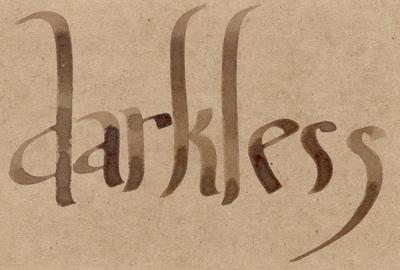Today, I gave a reading and performance at The Nave Gallery in Somerville, Massachusetts, as part of the VisionSound/SoundVision III festival of verbo-visual art. We decided to end the day at a hotel filled (well, almost) with other visual poets, and we reserved a room in a hotel right beside the Charles.
Because I was a bit tired, I quickly imagined and invented a small pwoermd encased in a bit of calligraphy. Luckily, I'd brought my entire mailart kit with me, so I pulled out my selection of metal brushes and my walnut ink, and wrote out the word "darkless" twelve times on a set of brown cards.
 Geof Huth, "darkless" (16 Jul 2005)
Geof Huth, "darkless" (16 Jul 2005)The recipients of this card were as follows:
1/12 Ruth and Marvin Sackner
2/12 Bob Grumman
3/12 Roy Arenella
4/12 Ruud Janssen
5/12 Dan Waber
6/12 Scott Helmes
7/12 K.S. Ernst
8/12 John M. Bennett
9/12 Karri Kokko
10/12 Christopher Fritton
11/12 RF Côté
12/12 qbdp
After receiving his copy of this card, my friend Karri Kokko wrote a little commentary on this poem (in Finnish). Later, he sent me this translation into English:
Pimeätön (darkless)
A postcard from Geof Huth, sent from Cambridge, Massachusetts, arrived this morning in my mailbox [actually through the mail slot in my front door]. It’s journey took only four days, so we really shouldn’t talk about snail mail here. The ink calligraphy, drawn on a simple brown cardboard with twelve perfectly executed strokes, forms a word that you won’t find in a dictionary but the meaning of which is still possible to put together. The word consists of two parts: first, there’s the English word “dark,” coupled with the addition “-less” [the Finnish equivalences for both given in parenthesis]. Put together they form a word that could be translated into Finnish as either “pimeätön” or “pimeydetön,” [the former being closer to “darkless” and the latter meaning more or less “darknessless”], both again not found in the dictionary, although grammatically perfect Finnish words. Although I myself prefer the form “pimeätön,” the other is actually closer to the original because of its connotation to the word “darkness” (although not meaning its opposite). Do we have a function for a word like this? No, if we are seeking an exact expression for the lack of dark, or darkness (i.e. light, lightness). But as a poem, as a form of poetic expression, Huth’s work is indispensable: it sets your mind in quick motion, forcing you to check the meaning of words and concepts, and patterns of reading a text. Naming things is taking hold of what’s there in the world. It’s enlightening to see how language enlightens our understanding of it, and the world, even if through an impossible negation. And what’s even better, there’s more to come…

The View from Room 772 of the Royal Sonesta Hotel Boston, Cambridge, Massachusetts (17 July 2005)(Photo by Geof Huth)
un violon d'ingres
2 comments:
Wouldn't you hate to look at that all day...
Jonathan,
And this was the picture of a cloudy Sunday. Imagine how it looked the bright Saturday that preceded it!
Geof
Post a Comment